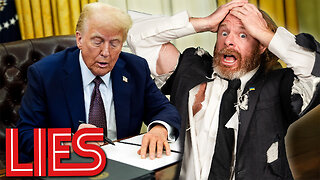Premium Only Content

Smart Cities can make an Urban area Bearable, but can they make Metropolises Valuable?
Scott Beyer - Owner, Market Urbanism Report & Journalist, Independent Institute
Marketubanismreport.com
That was a question asked at a Smart City conference a decade ago in London, one of the “smartest” cities in the world. With Covid rightly being seen as a setup for importing Communist behavioral controls and having exposed the government as a tool of the powerful, self-thinking Americans are rightly demanding details on what planners mean by “smart”.
It relies, for example, on The Internet of Things, with radio frequency antennas creating a mesh of radiation whose dangers the government has suppressed on behalf of its special interest biotech funders as much as Pharma special interests have suppressed the dangers of vaccines. Congress is waking up to the dangers of Pharma, but it seems blithely unaware of Telecom’s similar capture of the FCC.
This mesh of unrecognized radiation dangers couples with the panopticon danger Jeremy Bentham envisioned in the 1790s - where mass surveillance tracks our every move. Spotting crime in every corner of the city, or knowing how to get to work unhindered by congestion seem great reasons for a smart city, but Big Brother’s eye and unremitting radiation don’t come with Informed Consent.
When can Smart Cities be valuable to taxpayers? Perhaps in open-source tracking of government politicians and what they fund. Scott Beyer writes about urban modernization, for his consultancy as well as for the eminent Independent Institute. He advocates for better housing, transport, zoning, and other city policies. Cities make fascinating destinations and places to live, and we like progress. But we also like values, privacy, and liability for those that harm us. So what should a “Smart” city pursue?
-
 59:48
59:48
FREEDOMHUB
1 month agoWill Trump Let RFK & Salatin Detoxify School Lunches?
7703 -
 1:00:03
1:00:03
Candace Show Podcast
3 hours agoWOAH! Daily Wire CEO Shares HARSH Feelings About Brett Cooper | Candace Ep 138
57.8K117 -
 LIVE
LIVE
Dr Disrespect
7 hours ago🔴LIVE - DR DISRESPECT - TRIPLE THREAT CHALLENGE - NOBODY STOPS US
3,621 watching -
 1:54:45
1:54:45
Twins Pod
5 hours agoMAGA P***star is HATED By Conservatives AND Leftists... | Twins Pod - Episode 49 - Brandi Love
31.7K32 -
 15:45
15:45
inspirePlay
1 hour agoLong Drive Showdown: Martin Borgmeier vs. 3 of the World’s Longest Female Golfers at 8,000+ Yards!
93 -
 1:01:19
1:01:19
PMG
20 hours agoWere the California Fires Intentional & Shocker - the Vax May Cause Long COVID
5712 -
 39:53
39:53
Bare Knuckle Fighting Championship
1 day agoBKFC KNUCKLEMANIA V PHILADELPHIA Weigh-In | LIVE!
8731 -
 DVR
DVR
Scammer Payback
3 hours agoCalling Scammers Live
22.4K4 -
 1:10:38
1:10:38
Awaken With JP
4 hours agoJFK Files to be Released! Trump’s Boss Move - LIES Ep 75
47.2K40 -
 1:50:19
1:50:19
The Quartering
6 hours agoTrump NUKES The Deepstate, BANS Trans In Military & Terminates Dr. Fauci Protections!
89.2K64